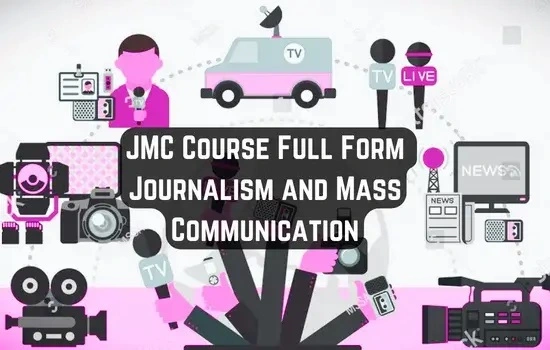The jmc course full form is Journalism and Mass Communication. Journalism, a subset of the broader Mass Communication field, embarks on a journey to gather, create, evaluate, and present news or information to the audience. It’s a field that has transcended the confines of print media, expanding its reach to encompass platforms like radio, television, and the vast expanse of the worldwide web. For aspirants intrigued by the art of storytelling and the pursuit of truth, a course in Journalism offers a gateway to a myriad of career opportunities.
What is this course about?

Journalism classes provide students all the tools to control media. Information gathering, analysis, and sharing across media platforms are taught. Students learn to create engaging tales, conduct insightful interviews, and understand complex situations via hands-on and theoretical experiences. Students learn how to disclose secrets and hold power responsible as investigative journalism evolves. Students study digital media development, including unique narrative and audience engagement techniques. Media ethics education helps students face ethical dilemmas honestly and responsibly.
Eligibility Criteria
Journalism is inclusive, thus prospective journalists have many academic backgrounds. Journalism courses allow Arts, Commerce, and Science students due to their wide eligibility. Whatever their qualifications, anybody who loves narrative and truth-telling may work in journalism. Journalism schools usually need a 50% score on 10+2 exams from a recognized board or university. This level gives students a solid academic basis for journalism. English or Hindi may be required for education, stressing the role of language in news and information delivery. Journalism schools provide a lively and inclusive learning environment that creates the next generation of journalists and media professionals by welcoming students from all academic backgrounds and encouraging skill development.
Future Scope
Journalism evolves with technology and audience tastes. This diversification affords journalism graduates many career routes with different growth and discovery opportunities. Investigative reporting and in-depth analysis thrive in print journalism while digital media advances. Millions of people watch and listen to TV and radio for real-time news and discussion. Internet and social media distribute news and engage people globally.
Salary
Journalism graduates have several media sector jobs. Journalism covers print, radio, internet, content, PR, and more. Journalism has several job paths for different interests and talents. Print, broadcast, digital, investigative, data, content, PR, editors, and newscasters are media professionals. These positions pay widely by experience, geography, and employer. Print journalists make INR 3.06 lakhs to INR 5 lakhs annually, but news anchors may earn INR 5 lakhs to INR 10 lakhs or more, showing journalism’s revenue potential.
This special Journalism and Mass Communication course happens to be a perfect opportunity for those willing to find a path in media industry. If the applicants have the right zeal, passion and skill, they can dedicatedly study these courses and come up with great results.